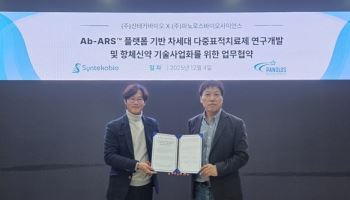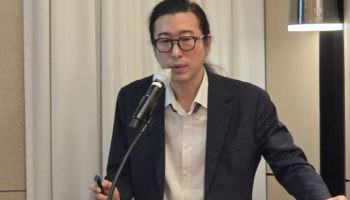[Song Young Doo, Edaily Reporter] AI drug discovery company Syntekabio announced on October 14 that it has officially launched its AI-driven Asset Programs, which aim to simultaneously identify antibody and small-molecule drug candidates using the company’s proprietary AI supercomputing infrastructure.
Recently, the global AI drug discovery industry has been shifting rapidly toward performance-oriented outcomes. The $500 billion Stargate Project under construction in Texas a 4.5 GW-scale data center combining AI and supercomputing for “biotech innovation” has drawn international attention. Syntekabio, however, moved two years earlier: the company began construction of its ABS(AI Bio Supercomputing) Data Center in Dungok, Daejeon, in May 2022 and obtained operational approval in October 2023.
The 15 MW ABS Center, while smaller in scale than the Stargate Project, pursues the same goal and is already being recognized for entering the stage of generating practical, outcome-driven achievements.
Syntekabio’s Asset Programs build on years of experience applying AI platforms to a wide range of target proteins including antibody targets, oncology, immunology, neurology, and COVID-19, with eight membrane proteins among them. The programs are large-scale strategic projects designed to rapidly secure vast numbers of candidate molecules for antibody and small-molecule targets of interest to global pharmaceutical companies, leveraging the ABS Center’s data infrastructure.
Unlike traditional experimental approaches that take several years, Syntekabio combines supercomputing and AI modeling to shorten discovery cycles to within six months and pre-select promising drug candidates with a higher probability of success securing a clear competitive advantage.
In the antibody segment, Syntekabio applies its proprietary Ab-ARS platform, which enables an advanced design process. AI designs the CDR(complementarity-determining region) the core part of an antibody and virtually generates tens of thousands of variants. Through 3D structural analysis and binding affinity evaluation, the platform selects optimal candidates for development. Currently, about 20 antibody target programs are under way, including globally significant targets such as PD-1, HER2, and IL-23.
For small-molecule drug discovery, the company uses its core LM-VS(Language Model Virtual Screening) platform. LM-VS, based on large-language-model virtual screening technology, can rapidly explore chemical libraries containing over 10 billion compounds to identify high-potential candidates. It then applies 3D-CNN structure prediction, binding-energy calculations, and molecular-dynamics simulations to discover optimized candidates for target proteins. Approximately 20 programs are in progress, covering difficult-to-treat cancers and metabolic disorders, including KRAS, JAK, and GLP-1R targets.
Currently, Syntekabio is deploying around 2,000 supercomputing units at the ABS Center to run antibody and small-molecule discovery projects in parallel. The candidate molecules are being prioritized through in-depth discussions with global marketing partners, and the company is pursuing pre-order-based business operations. Syntekabio plans to continue discovering new candidates while simultaneously seeking license-out opportunities.
CEO Jong-Sun Jeong stated, “The Asset Program is more than a candidate discovery initiative it marks a major milestone showing that our proprietary AI drug-discovery platform has entered a commercialization phase. By leveraging the power of supercomputing and differentiated AI algorithms, we will secure large numbers of antibody and small-molecule candidates that global pharmaceutical companies are eager to access, laying the groundwork for meaningful revenue generation.”
Building on this program, Syntekabio plans to extend its AI platforms beyond antibodies and small molecules to bispecific antibodies, ADCs, and PROTACs, strengthening its position in the global drug discovery market.






![김종근 흥케이병원장 "카티라이프 시술환자, MRI 보면 확실히 달라"[전문가 인사이트]](https://image.edaily.co.kr/images/vision/files/NP/S/2025/12/PS25120700034b.jpg)
!['상장 첫날 시총 2.8조' 에임드바이오, 코스닥 다크호스 급부상 [바이오맥짚기]](https://image.edaily.co.kr/images/vision/files/NP/S/2025/12/PS25120500172b.jpg)
![창업 10년 만에 엑시트한 권병세 유틸렉스 대표[화제의 바이오人]](https://image.edaily.co.kr/images/vision/files/NP/S/2025/12/PS25120700059b.jpg)

![[단독]할로자임, 독일서 '키트루다SC' 유통 금지 가처분 승소…알테오젠에 미칠 파장은?](https://image.edaily.co.kr/images/vision/files/NP/S/2025/12/PS25120500443b.jpg)